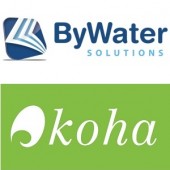Koha Klassmates Adopted by 20 Library Schools
Twenty library and information science programs have begun using free hosted instances of the Koha open-source integrated library system (ILS) as an instructional resource via the Koha Klassmates program launched by ByWater Solutions.
 Twenty library and information science programs, including the University of Illinois at Urbana-Champaign, the University of Washington, Rutgers University, Indiana University–Purdue University Indianapolis (IUPUI), and the University of Pittsburgh, have begun using free hosted instances of the Koha open-source integrated library system (ILS) as an instructional resource via the Koha Klassmates program launched by ByWater Solutions last fall.
Twenty library and information science programs, including the University of Illinois at Urbana-Champaign, the University of Washington, Rutgers University, Indiana University–Purdue University Indianapolis (IUPUI), and the University of Pittsburgh, have begun using free hosted instances of the Koha open-source integrated library system (ILS) as an instructional resource via the Koha Klassmates program launched by ByWater Solutions last fall.
ByWater is a for-profit company that provides migration, hosting, training, help desk, and development support for Koha, but Nathan Curulla, co-owner and chief revenue officer, explained that the company decided to install and host these Koha instances for free as an investment in the future.
"We were frustrated that people [in the library field] didn't know a lot about open source, and had a lot of misconceptions," Curulla said. “We're going to be educating people in library schools so that when they [graduate] and start using an ILS in their libraries, they'll already know about Koha. They'll know the benefits of the software, and they won't be scared of it.”
Familiarity will ultimately lead to advocacy for open source, he added.
“We're hoping that they'll go into a library that's using a proprietary system that would cost five times what they would pay for [maintaining or outsourcing support for] Koha, and they’ll say, ‘Why aren’t we using Koha? I learned on this software, it’s great.’ We’re trying to break down those boundaries and invest in the next generation of librarians.”
Nicole Engard, VP of community outreach for ByWater, said that individual instructors from any institution can request Koha Klassmates installations. ByWater is not requiring a broader arrangement with a university or library school. All that is required are “a teacher and some students,” Engard said. “We do everything for them. We host it and upgrade it and install it. So they just need a class that needs to learn on an ILS and we have them set up in 20 minutes.”
Instructors have requested installations for cataloging and RDA classes, as well as courses on library information systems, she said. William Helling, an IUPUI instructor and systems administrator for the Crawfordsville District Public Library (CDPL) who has been teaching a library systems course for 16 years, noted that even students with experience working with an ILS can benefit from hands-on experience with a system.
“It may be the only chance they have to see every component of the system,” and how different components work together, and to explore the system with administrator-level permissions, Helling explained. The course involves “a lot of background reading on ILS and vendors, and new movements and standards, and relational databases and discovery systems. And we relate that to what we do, in this case, with the Koha ILS.”
Prior to the launch of Koha Klassmates, Helling had used “Koha With Class” a similar program offered by LibLime, a subsidiary of PTFS (Progressive Technology Federal Systems) that develops forks of Koha under the LibLime Koha and LibLime Academic Koha brands. “ByWater has a great reputation for customer satisfaction…from the [Marshall] Breeding annual surveys, and since they were doing this for the first time, I thought I’d jump from one to the other,” Helling said.
Klassmates hosts preconfigured instances of Koha that include sample items that have already been cataloged, along with common patron types, item types, and circulation rules already set up. Helling, however, prefers to have his students start from scratch, so he deletes everything prior to beginning each course. “We start from the very beginning, deciding what type of library we want to have,” he said, noting that some courses have chosen to simulate a public library, and others have chosen academic libraries.
“We decide as a group what kind of things [our library] will do, and plan it out…and with admin [level] access, they can make patrons, catalog books, all sorts of things. We build from the ground up, as if we were making our own ILS for our own library. And during the last two weeks, we pretend like we are going to get ourselves out of this system and [migrate] to a new system. So we talk about database cleanup, reports we’ll need to run, and problems involved with migration. We do a birth, life, and death of an ILS in this course.”
And while the course uses Koha for hands-on training, Helling said that key concepts should translate well when students work on other systems. Helling has worked with Polaris at CDPL since 1998, for example, and while he can’t give students live access to that system, he provides screenshots and descriptions for comparison. And many of his students are working in libraries already, which sometimes leads to discussions about other commercial systems as well.
“All of them have the same basic components,” he said. ByWater encourages comparison with commercial systems in classroom settings, Curulla said, adding that the company is also hoping that Koha Klassmates helps initiate a dialog with new librarians. “This gives them hands-on experience using an ILS, and what’s great about it also is that we get feedback on what they think should change…. That’s really important and beneficial information to us.”
RELATED
ALREADY A SUBSCRIBER? LOG IN
We are currently offering this content for free. Sign up now to activate your personal profile, where you can save articles for future viewing









Add Comment :-
Comment Policy:
Comment should not be empty !!!